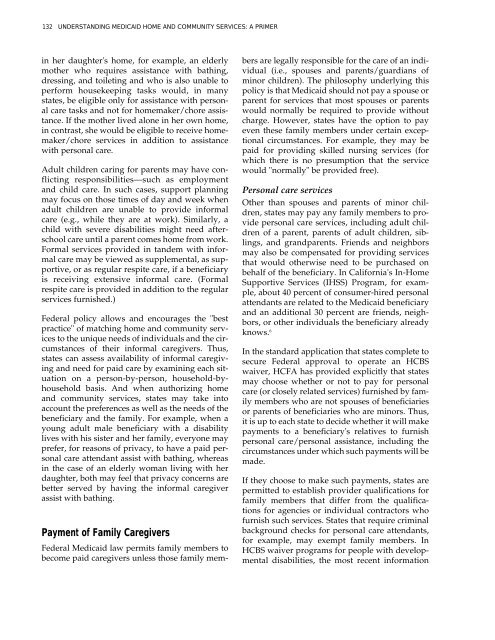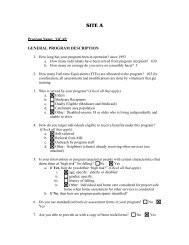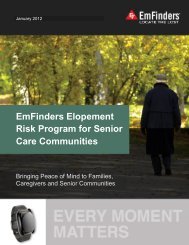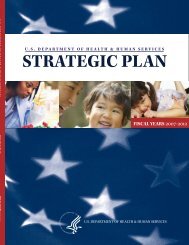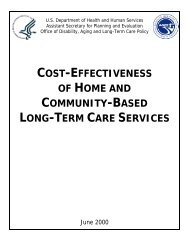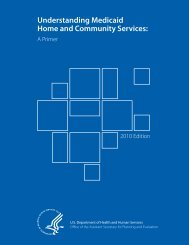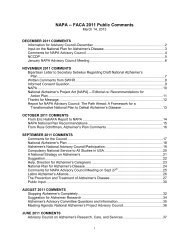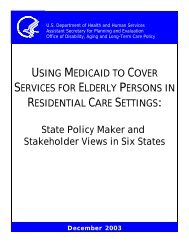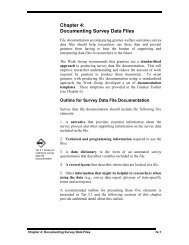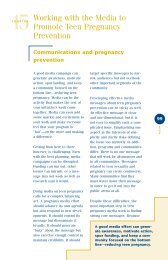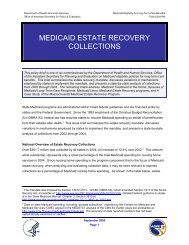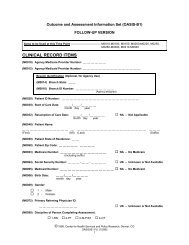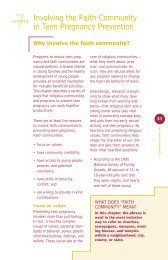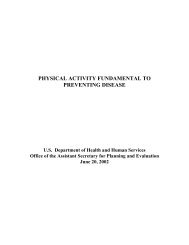Full PDF Version - ASPE - U.S. Department of Health and Human ...
Full PDF Version - ASPE - U.S. Department of Health and Human ...
Full PDF Version - ASPE - U.S. Department of Health and Human ...
- No tags were found...
You also want an ePaper? Increase the reach of your titles
YUMPU automatically turns print PDFs into web optimized ePapers that Google loves.
132 UNDERSTANDING MEDICAID HOME AND COMMUNITY SERVICES: A PRIMERin her daughter's home, for example, an elderlymother who requires assistance with bathing,dressing, <strong>and</strong> toileting <strong>and</strong> who is also unable toperform housekeeping tasks would, in manystates, be eligible only for assistance with personalcare tasks <strong>and</strong> not for homemaker/chore assistance.If the mother lived alone in her own home,in contrast, she would be eligible to receive homemaker/choreservices in addition to assistancewith personal care.Adult children caring for parents may have conflictingresponsibilities—such as employment<strong>and</strong> child care. In such cases, support planningmay focus on those times <strong>of</strong> day <strong>and</strong> week whenadult children are unable to provide informalcare (e.g., while they are at work). Similarly, achild with severe disabilities might need afterschoolcare until a parent comes home from work.Formal services provided in t<strong>and</strong>em with informalcare may be viewed as supplemental, as supportive,or as regular respite care, if a beneficiaryis receiving extensive informal care. (Formalrespite care is provided in addition to the regularservices furnished.)Federal policy allows <strong>and</strong> encourages the "bestpractice" <strong>of</strong> matching home <strong>and</strong> community servicesto the unique needs <strong>of</strong> individuals <strong>and</strong> the circumstances<strong>of</strong> their informal caregivers. Thus,states can assess availability <strong>of</strong> informal caregiving<strong>and</strong> need for paid care by examining each situationon a person-by-person, household-byhouseholdbasis. And when authorizing home<strong>and</strong> community services, states may take intoaccount the preferences as well as the needs <strong>of</strong> thebeneficiary <strong>and</strong> the family. For example, when ayoung adult male beneficiary with a disabilitylives with his sister <strong>and</strong> her family, everyone mayprefer, for reasons <strong>of</strong> privacy, to have a paid personalcare attendant assist with bathing, whereasin the case <strong>of</strong> an elderly woman living with herdaughter, both may feel that privacy concerns arebetter served by having the informal caregiverassist with bathing.Payment <strong>of</strong> Family CaregiversFederal Medicaid law permits family members tobecome paid caregivers unless those family membersare legally responsible for the care <strong>of</strong> an individual(i.e., spouses <strong>and</strong> parents/guardians <strong>of</strong>minor children). The philosophy underlying thispolicy is that Medicaid should not pay a spouse orparent for services that most spouses or parentswould normally be required to provide withoutcharge. However, states have the option to payeven these family members under certain exceptionalcircumstances. For example, they may bepaid for providing skilled nursing services (forwhich there is no presumption that the servicewould "normally" be provided free).Personal care servicesOther than spouses <strong>and</strong> parents <strong>of</strong> minor children,states may pay any family members to providepersonal care services, including adult children<strong>of</strong> a parent, parents <strong>of</strong> adult children, siblings,<strong>and</strong> gr<strong>and</strong>parents. Friends <strong>and</strong> neighborsmay also be compensated for providing servicesthat would otherwise need to be purchased onbehalf <strong>of</strong> the beneficiary. In California's In-HomeSupportive Services (IHSS) Program, for example,about 40 percent <strong>of</strong> consumer-hired personalattendants are related to the Medicaid beneficiary<strong>and</strong> an additional 30 percent are friends, neighbors,or other individuals the beneficiary alreadyknows. 6In the st<strong>and</strong>ard application that states complete tosecure Federal approval to operate an HCBSwaiver, HCFA has provided explicitly that statesmay choose whether or not to pay for personalcare (or closely related services) furnished by familymembers who are not spouses <strong>of</strong> beneficiariesor parents <strong>of</strong> beneficiaries who are minors. Thus,it is up to each state to decide whether it will makepayments to a beneficiary's relatives to furnishpersonal care/personal assistance, including thecircumstances under which such payments will bemade.If they choose to make such payments, states arepermitted to establish provider qualifications forfamily members that differ from the qualificationsfor agencies or individual contractors wh<strong>of</strong>urnish such services. States that require criminalbackground checks for personal care attendants,for example, may exempt family members. InHCBS waiver programs for people with developmentaldisabilities, the most recent information


